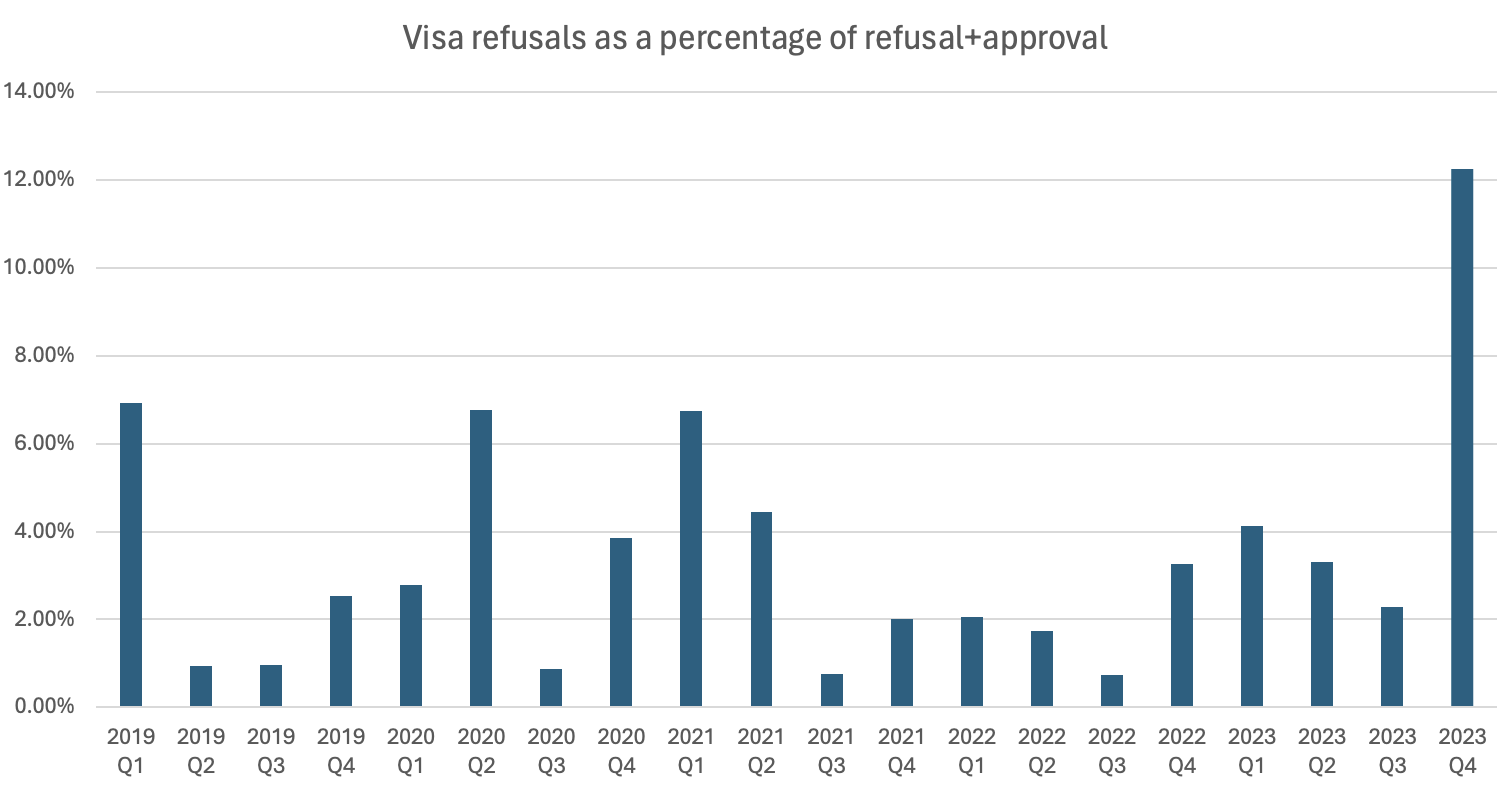What’s going on inside UKVI?
Jim is an Associate Editor (SUs) at Wonkhe
Tags
That’s partly because the tight reporting date set for the MAC appears to be timed to come in the slipstream of what are expected to be persistently high net migration figures for 2023 in the same fortnight.
Before we get there, it would be nice if the Home Office could publish its official assessment of the impact of its last round of rule changes – principally the dependant ban for PGTs.
In December, the Home Office said that an impact assessment had been produced for changes affecting the student route but was “awaiting final Departmental clearances”. We’re still waiting.
But outside of the headline immigration rules, UKVI and its sponsoring department the Home Office have always had plenty of other levers to pull to speed up and increase, or slow down and decrease the volume of international students in the UK.
And something appears to be going on.
If we, for example, look at student visa approvals and refusals for the past few years, there looks to have been a significant unannounced tightening in Q4 last year:

That headline 12.3 per cent hides quite significant differences by country. It was 0.02 per cent for China, but over ten per cent for India, Pakistan and Nigeria.
There might be all sorts of reasons for that – an increase in fraudulent applications from more desperate agents as demand falls, or an improvement in enforcement, for example.
But I also hear from around the sector that as well as refusal rates being up, visa processing times are slowing to a crawl, UKVI is bearing down on CAS allocation where there are quality concerns, and it’s asking increasingly searching questions on attendance, compliance and both internal and external infrastructure.
It’s frustrating because it’s hard to “see” exactly what’s going on – and the lack of reporting means that we can’t see the full scale of changes, and the extent to which it’s being driven by changes in the applicants, changes in UKVI behaviour or change in provider conduct.
That increased interest in “quality”, for example, may well be a result of a laggy indicator on completion. If you go from, say, 100 international PGTs to 2,000 in your business school over two years and your completion rates fall, that feeds through into additional regulatory interest and compliance concerns eventually.
The upshot of course is that wherever the university thinks it is on recruitment, if the assumptions on CAS allocation, visa issuance, arrival and default haven’t been revised, target X might still represent an undershoot on the expected financial contribution.
And when you add to that the inevitable increases in agent fees being trousered that accompany a slowing of demand from students, those excel sheets might need another miserable tweak.
We’re unlikely to get honesty and transparency out of UKVI or its sponsoring department. But the big question is why UKVI allowed international PGT to get so big so fast.
Was it given a post-Brexit, post-pandemic nod to let applications for huge increases of CAS allocations to go relatively unchecked? Were their eyes elsewhere, and they then got a ministerial bollocking leading to an overcorrection? It’s a mystery.
Even if it was able to justify what seems to be happening now on compliance and quality grounds, if OfS was doing its job (certainly for England, OfS is the official “educational oversight body” in the immigration rules) shouldn’t it have expressed concern about rapid expansion before having to handle the implications of rapid contraction?
Meanwhile the Home Office continues to maintain that “all study” is supposed to be taking place on the premises of the student sponsor, unless the student is on a course-related work placement, a study abroad programme overseas, or a pre-sessional course – despite attendance getting tougher to secure (distance from campus, often off-book +20hours a week work to afford to pay fees) and plenty of providers still operating explicitly blended programmes.
If that is all being tightened too, regardless of any changes to the graduate route, depending on the income from international PGT all looks shakier still in forward projections.
Of course caught up in all of that are students themselves – whose interests are secondary to those of a Home Office desperate to get numbers down, and a sector desperate to keep numbers up. That push me/pull you just results in students being mugged off and messed about at every stage.
It was never an explicitly representative or campaigning body – but in this context the apparent defunding of UKCISA by the Department for Education after 40 years is one of the most miserable things I’ve seen this government do.

